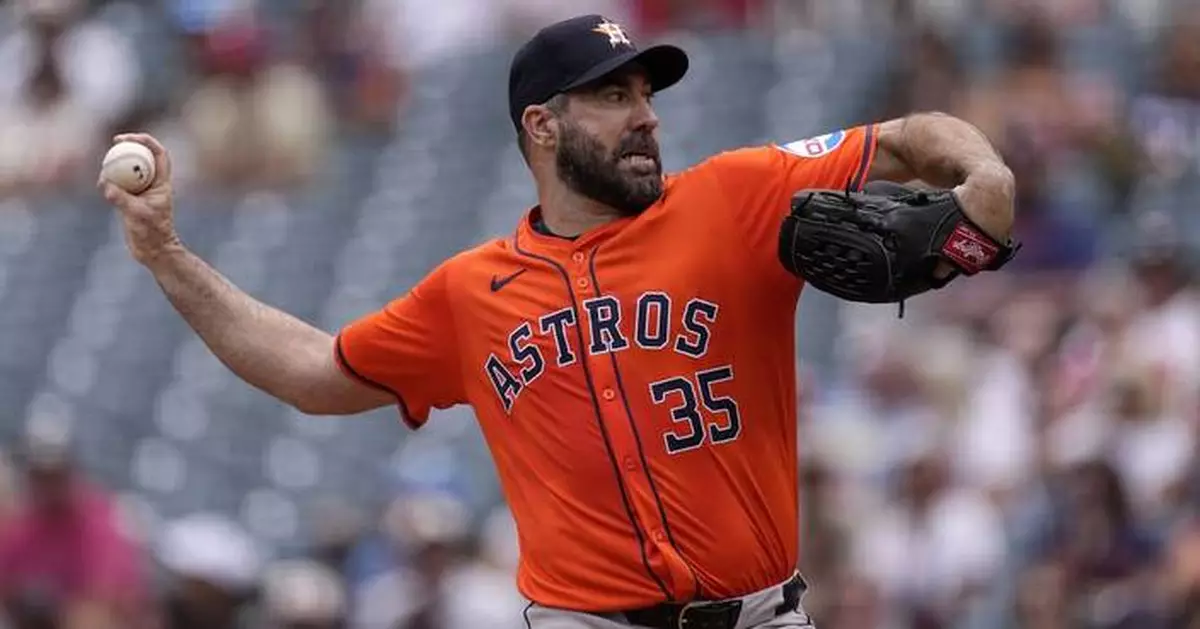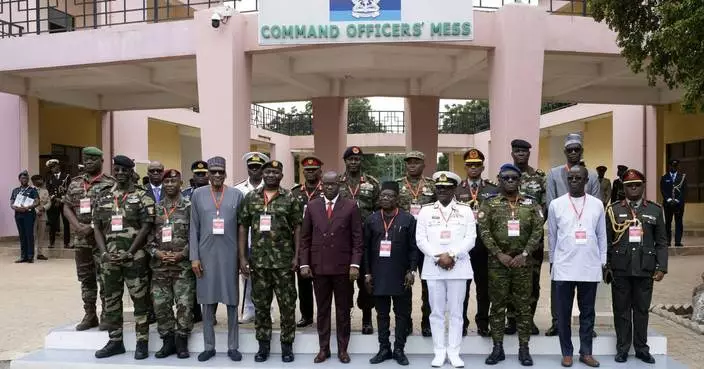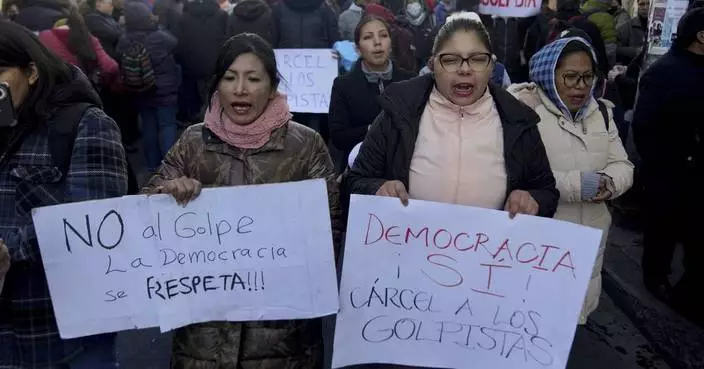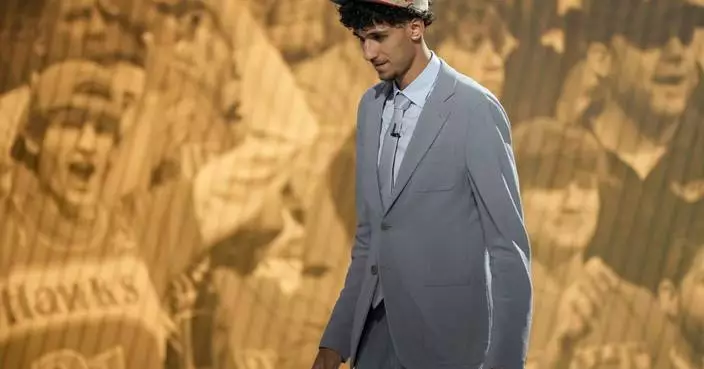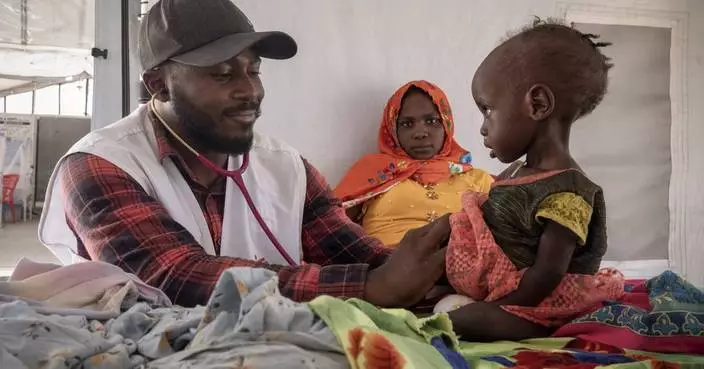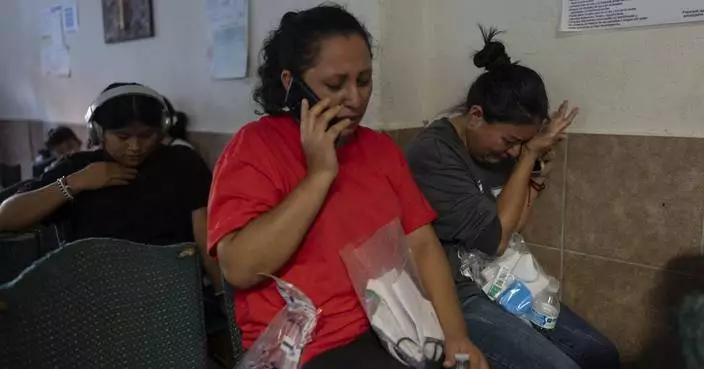CHICAGO (AP) — Houston Astros ace Justin Verlander went on the 15-day injured list on Tuesday to give him more time to resolve his lingering neck discomfort.
The 41-year-old Verlander was scratched from Saturday’s start against the Detroit Tigers. The three-time AL Cy Young Award winner also missed the start of the season due to inflammation in his right shoulder.
Verlander had been trying to pitch through the neck issue, but it wasn't getting any better.
“He just wasn't feeling well enough to start playing catch,” manager Joe Espada said before Houston's 2-0 loss at the Chicago White Sox. “So he just needs some more time to get over this."
Espada said there was no further testing planned for Verlander.
“We're just going to give him some time with no throw and see if we can get some of that neck discomfort (and) stiffness out of there before he starts throwing again,” Espada said.
Houston has been hit hard by injuries, especially on the pitching side. Cristian Javier and José Urquidy each had Tommy John surgery this month. Lance McCullers Jr. and Luis Garcia could return after the All-Star break after missing the start of the season as part of the recovery process from major operations.
Verlander is 3-2 with a 3.95 ERA in 10 starts this season. Espada said a timeline for Verlander's return depends on his recovery.
“Definitely will miss a start, but we'll see how long it would take to get him back on the mound,” he said.
Espada said he wasn't ready to announce a starter for Thursday's game against the White Sox. Spencer Arrighetti, who subbed for Verlander on Saturday, is one possible option.
Right-hander Nick Hernandez was recalled from Triple-A Sugar Land to replace Verlander on the roster.
Houston also was without sluggers Yordan Alvarez and Kyle Tucker for the opener of its three-game set at Chicago.
Alvarez was dealing with a family matter, Espada said, but could be back in the lineup as soon as Wednesday. Alvarez is batting .290 with 14 homers and 37 RBIs in 71 games this season.
Tucker, who leads the Astros with 19 homers, is on the 10-day IL with a bruised right shin.
“He's doing better. Just slower than we were expecting,” Espada said. “We were expecting him by today just kind of start running around and moving around. He's doing some of that, but in the weight room.”
AP MLB: https://apnews.com/hub/MLB
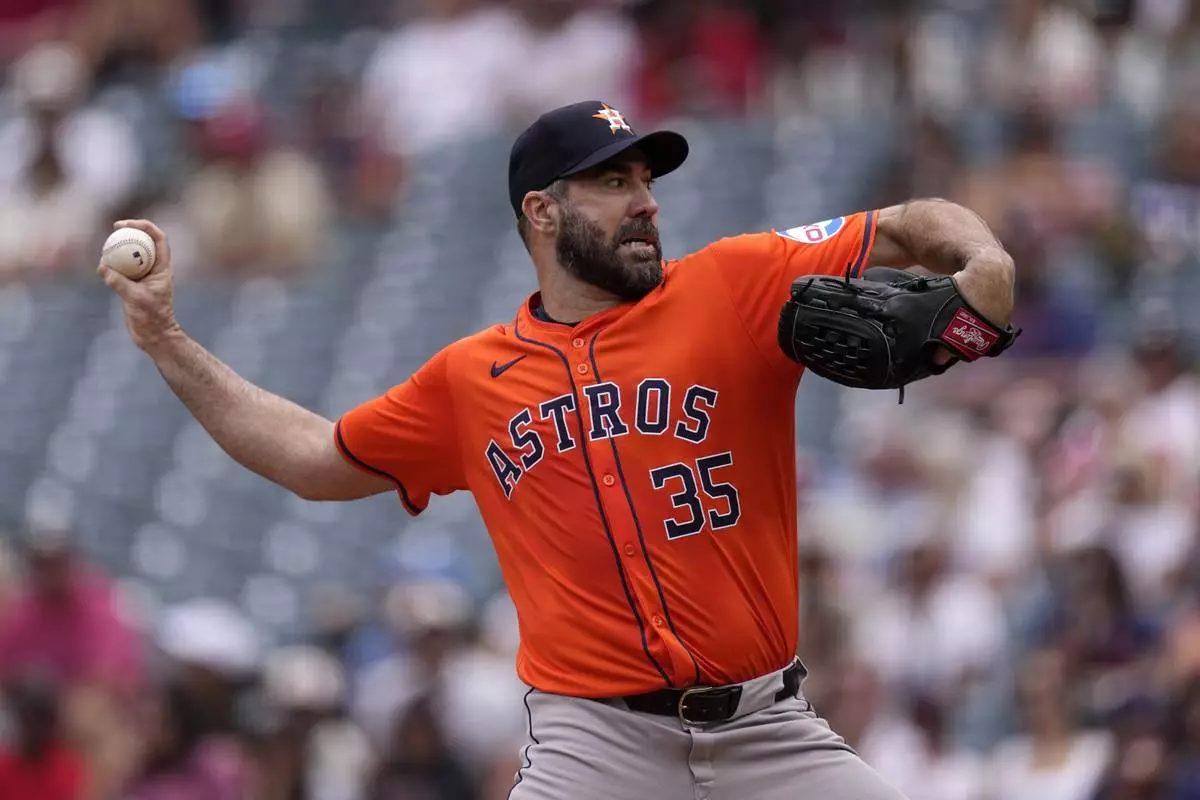
Houston Astros starting pitcher Justin Verlander throws to the plate during the first inning of a baseball game against the Los Angeles Angels Sunday, June 9, 2024, in Anaheim, Calif. (AP Photo/Mark J. Terrill)
MINNEAPOLIS (AP) — USA Gymnastics was a house afire five years ago, the massive fallout surrounding the Larry Nassar sexual abuse scandal rendering one of the U.S. Olympic movement's marquee programs radioactive.
Lawsuits. Bankruptcy. Potential decertification. A revolving door at the top as CEOs incapable or unwilling to find a path forward came and went. Sponsorships vanished.
And perhaps most damaging of all: the erosion of trust between the organization and its tens of thousands of members, from the men and women competing at this week's Olympic trials to club owners to coaches to the parents of kids just starting out.
Before Li Li Leung took the job as president and CEO of the flailing national governing body in early 2019, the former Michigan gymnast turned NBA executive asked a longtime mentor for guidance.
“He said to me ‘You have the opportunity to be a part of potentially the greatest turnaround in sporting history, how can you not take it?’” Leung told The Associated Press. “And I'm like, 'That's pretty compelling.'"
So is the progress.
Five-plus years after taking over, things are improving. Not perfect — fitting for a sport where perfection is essentially unattainable — but better. Legally, fiscally and Leung believes, culturally.
A packed Target Center will be awash this weekend with the logos of blue-blood corporate partners that fled in the wake of the Nassar revelations. Underneath the rebranded USA Gymnastics logo, athletes eyeing a spot in Paris will compete in an environment they believe is in a far healthier place than it was between the 2016 and 2020 Olympics.
Few have watched this methodical evolution unfold more closely than seven-time Olympic medalist Simone Biles. The 27-year-old superstar publicly identified herself as a Nassar victim in early 2018 and has never shied away from taking those in power to task. Asked recently where her relationship with USA Gymnastics stands as she aims for a third trip to the Games, Biles strikes a more conciliatory tone.
“I think it's changed because a lot of the people in there have changed,” she said. “They have stepped up to the role. They've done the work. They put in the work.”
Leung wants to get something straight. She didn't intend to hire an executive leadership team comprised entirely of women — from Chief Operating Officer to the organization's first-ever Chief of Athlete Wellness on down — to mirror the makeup of an organization whose membership is 85% female. It just sort of happened.
There were specific qualities Leung was looking for as she tried to put together a group that could help lead USA Gymnastics out of the wilderness, and one she was trying to avoid.
“They couldn't possess any ego at all,” Leung said. “I knew in order for us to do what we had to do ... they had to realize it wasn't about them as an individual, but it was about the wider mission, the wider purpose of what we're trying to achieve.”
Enter people like Stefanie Korepin. A former member of the U.S. rhythmic gymnastics national team in the late 1990s and early 2000s, Korepin admits she “wanted nothing to do with” the sport when she retired.
Korepin earned her MBA and went into the corporate world before realizing the sport was in her blood. She began moonlighting as a judge before eventually becoming an interim board member in 2018, a decision that eventually led Korepin to her current role as chief program director.
“It was a burning building, and if anyone had their eyes wide open, it was me,” she said. “I was on the board. I saw everything that was happening. I saw exactly what the organization was facing.”
Korepin remembers feeling "a bit disillusioned" as a national team member, a time when she felt decisions were made in the dark and never explained. The result was “a lot of distrust.”
One of her guiding principles has been trying to pull the veil back as much as possible. This weekend, when the selection committees meet to pick the men's and women's Olympic teams, there will be an independent observer in the room who will later submit a detailed report on how the committee arrived on who's in and who's out.
It's a process Korepin integrated before the 2020 Olympics, one the organization follows for major international assignments. After some initial pushback from what Korepin described as “PTSD because the organization was constantly in the spotlight for not the right reasons,” it has been embraced.
USA Gymnastics has also implemented a new athlete funding model, a tiered system based on performance that provides very specific guidelines for each discipline — from women's artistic gymnastics down to non-Olympic sports like double mini-trampoline.
Gone is the mystery of how the money is divided. In its place is the kind of peace of mind Korepin didn't have when she was competing.
“There can be a lot of mental stress to support yourself or for a family trying to support an elite athlete,” she said. “This helps with their mental health knowing they have funding. I think it plays a little piece of the puzzle in helping the athletes stay in the sport longer because they know what to expect.”
The organization also divided the responsibilities at the top of the women's elite program, creating a new paradigm that includes 2008 Olympians Chellsie Memmel and Alicia Sacramone Quinn working together to guide a five-woman team that will arrive in Paris as heavy gold-medal favorites.
Their presence works on multiple fronts. It does away with the optics of making it seem as if there is just one person in charge of the decision-making while giving the athletes leaders who understand what it takes to get to this moment better than anyone.
“They’ve been through exactly what we’ve been through, they’ve been to those world championships, they’ve been to those Olympic Games,” Biles said. “They have had their ups and they have had their downs so I think that their leadership has helped evolve (the senior program).”
Biles dragged the importance of mental well-being into the spotlight when she withdrew from multiple finals at the 2020 Olympics due to what she labeled " The Twisties."
As part of its sponsorship agreement with an apparel company, USA Gymnastics began setting aside money that reimburses national team members and their coaches for visits to mental health professionals when they're back home.
Leung described interest and participation in the program as “really good," adding it was important to make sure the services weren't limited strictly to the athletes.
“Athlete-centricity means supporting the entire ecosystem that supports the athletes,” Leung said. “And supporting the coaches is really important.”
That support can come in different forms. And species.
USA Gymnastics makes therapy dogs, led by Beacon, a golden retriever, a staple at major events. The idea came from rhythmic gymnastics vice president Caroline Hunt — who advocated for it for several years — and Leung, who witnessed the effect comfort dogs had on her father during a hospital stay.
The trickle-down benefits have been surprising. While the dogs — several friends joined Beacon during U.S. Championships earlier this month — have helped the gymnasts relax, they've also been a hit with coaches and judges, lowering anxiety levels all around.
“I have seen the most stoic coaches soften around the dogs," Leung said. “It's actually pretty incredible to see.”
There is a level of optimism around USA Gymnastics that didn't exist a half-decade ago. Still, progress in some areas has been slow.
While Leung believes there is now a “culture of reporting” around suspected abusive behavior at member gyms, the lack of funding and manpower at the SafeSport Center — an independent entity that handles allegations of abuse from various governing bodies across the U.S. Olympic movement — has made investigations move at a sloth-like pace if they even end up being adjudicated at all.
Though elite gymnastics has never been more diverse, that diversity does not extend to judging panels, which lean heavily toward white men and women. Korepin called growing the judging pool in general “a priority,” and added that it starts with recruiting and increased education.
Over a dozen cities have expressed interest in bidding for a training and wellness center that would serve as a centralized hub for all national team disciplines, with the hope that groundbreaking on the site — whenever it might be — would come well before the 2028 Olympics in Los Angeles.
While encouraged by the response, there are potential political landmines too. Though a given state's stance on women's rights will part of the “decision-making matrix," Leung stressed the focus will be on the “whole proposal.”
Perhaps the biggest shift during Leung's tenure is that the headlines being generated around USA Gymnastics center on what's happening on the competition floor, not off it.
It's telling of how far things have come that Biles felt comfortable leaving her rotation during the final day of the U.S. Championships earlier this month to lend support to 2020 Olympic champion Sunisa Lee after Lee fell during her vault dismount.
There was no checking with the coaches for permission. Biles had the freedom to do what she felt was necessary in the moment, running over to comfort Lee then joining her backstage to offer a pep talk.
It served as a reminder that “at the end of the day they’re young women who care about each other,” said Quinn, who helped the U.S. win silver at the 2008 Olympics and now serves as the strategic lead for the senior women's program.
That wasn't always the case.
“It was showing a sign of weakness to have feelings about another teammate or athlete hoping to do well,” said Quinn, who helped the U.S. win a team silver at the 2008 Olympics. “It’s not that way anymore.”
And while the scars of the largest sexual abuse scandal in sports history at USA Gymnastics may always be visible, there is a sense of progress even though all involved know the job is far from finished.
It may never be finished because there is no such thing as an environment that's too safe, too open, too transparent.
Still, they remain wary of getting ahead of themselves. There have been mistakes. There will be mistakes. Yet there are signs that the trust that was practically non-existent during the organization’s darkest days is returning.
Considering the firestorm Leung and her team sprinted toward, it's a start.
“I think that there is a belief in the community that our intent is good,” Leung said, “and we're really trying to do the right things.”
AP Summer Olympics: https://apnews.com/hub/2024-paris-olympic-games
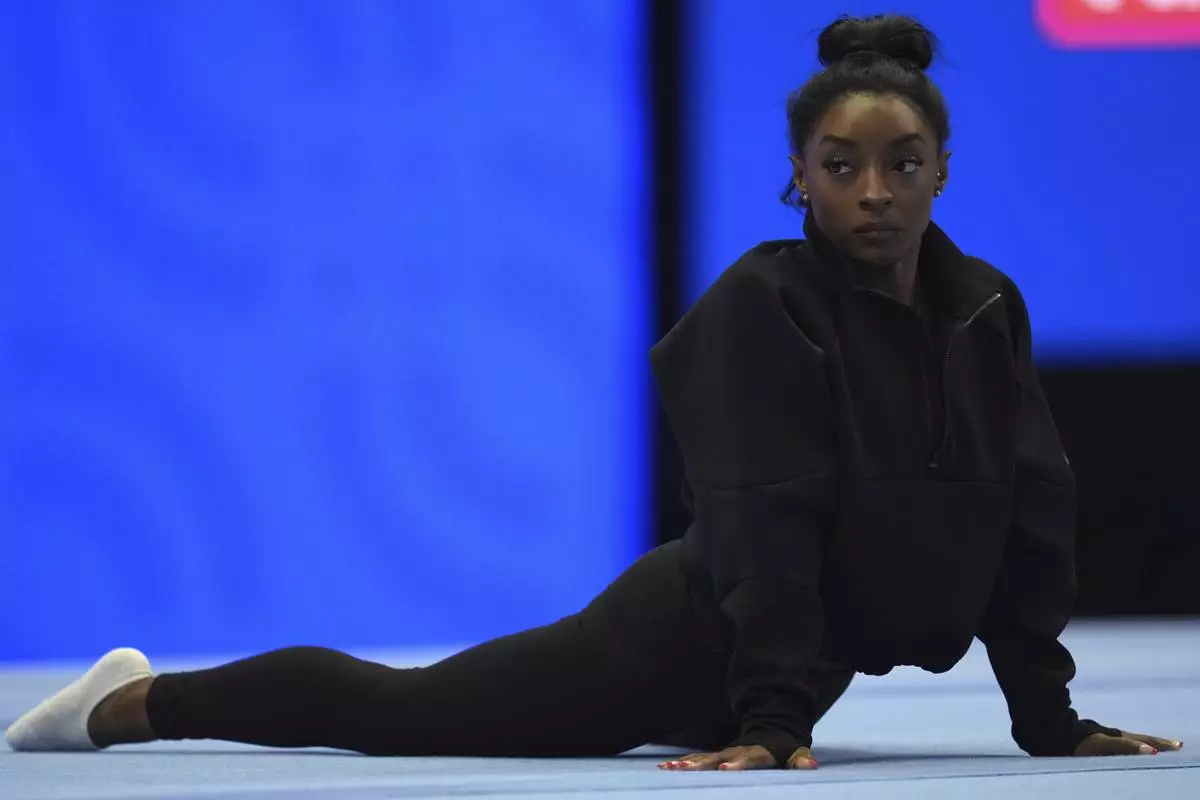
Simone Biles stretches during a training session ahead of the U.S. Gymnastics Olympic Trials Wednesday, June 26, 2024, in Minneapolis. (AP Photo/Abbie Parr)
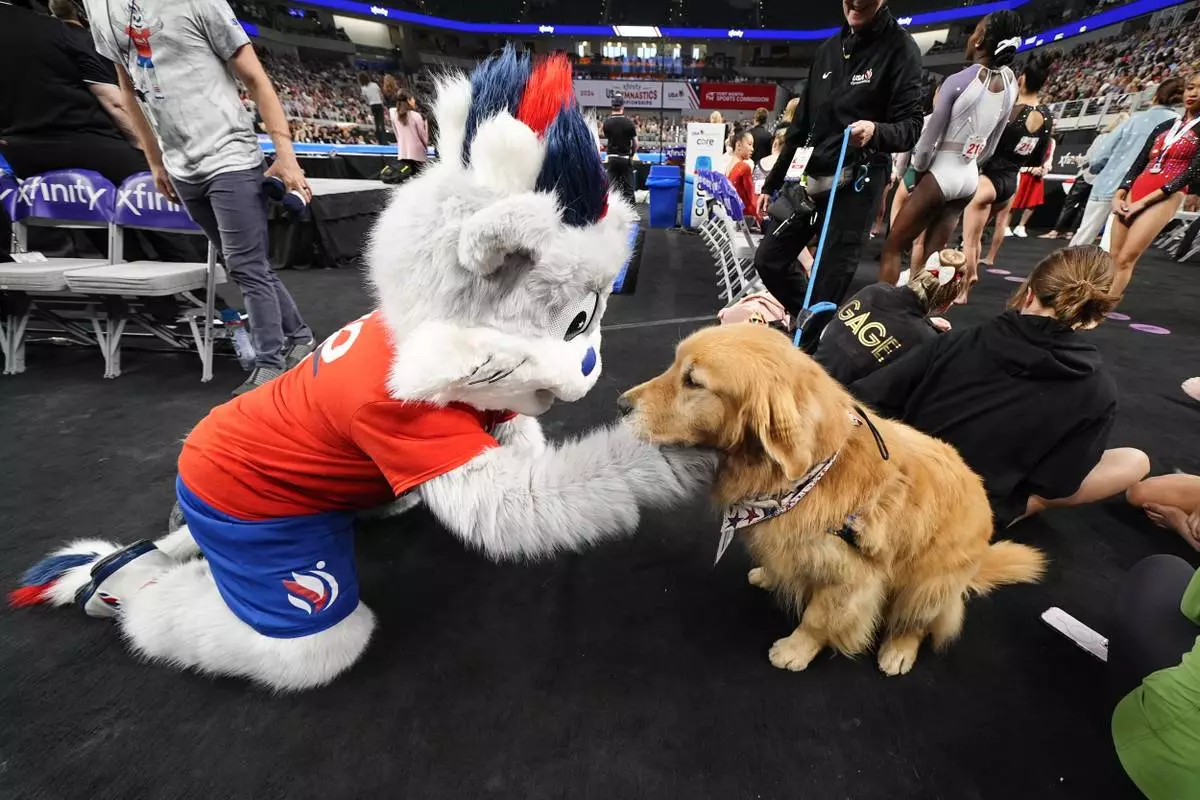
FILE - Support dogs are greeted by athletes during the U.S. Gymnastics Championships, June 2, 2024, in Fort Worth, Texas. USA Gymnastics makes therapy dogs a staple at major events to help gymnasts relax, they've also been a hit with coaches and judges, lowering anxiety levels all around. (AP Photo/Julio Cortez, File)
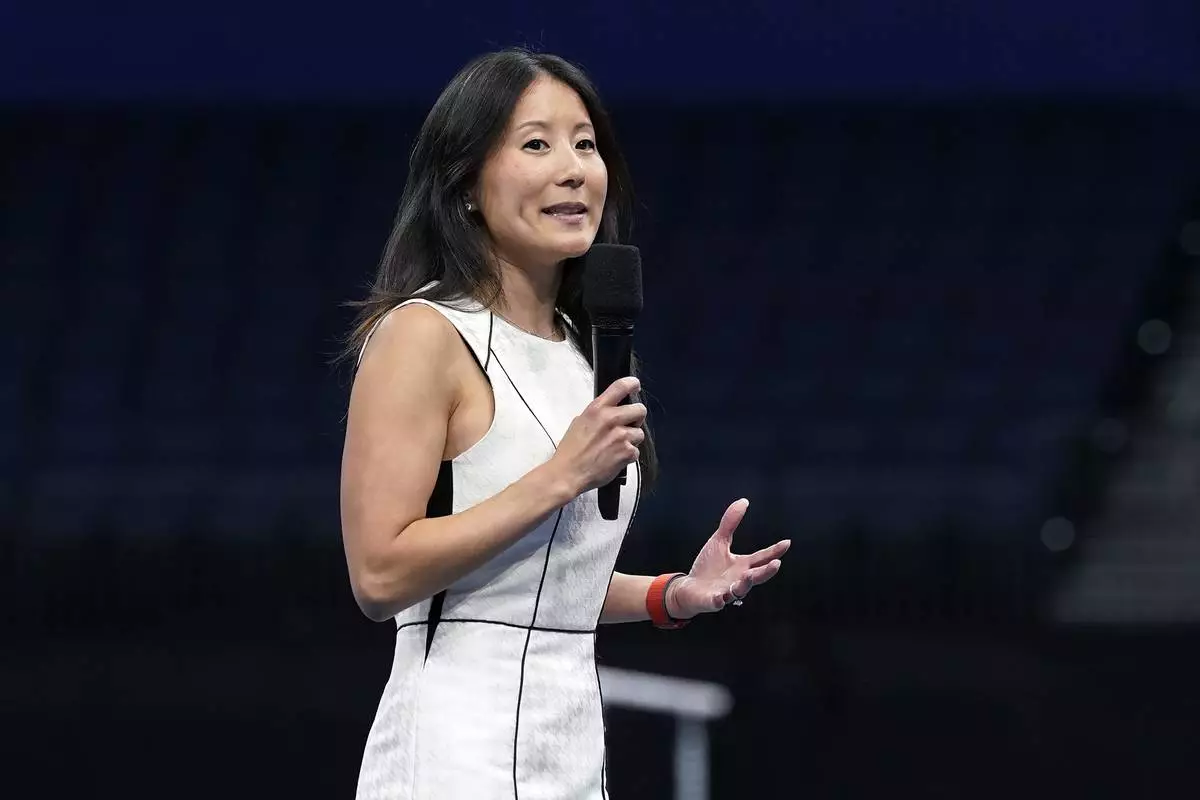
FILE - Li Li Leung, president of USA Gymnastics, speaks during the U.S. gymnastics championships Aug. 18, 2022, in Tampa, Fla. USA Gymnastics believes it is building momentum toward a better future as the 2024 Olympics near. President Li Li Leung and her team have placed an emphasis on transparency and support in hoping to re-establish trust in athletes, coaches and gym owners alike. (AP Photo/Chris O'Meara, File)
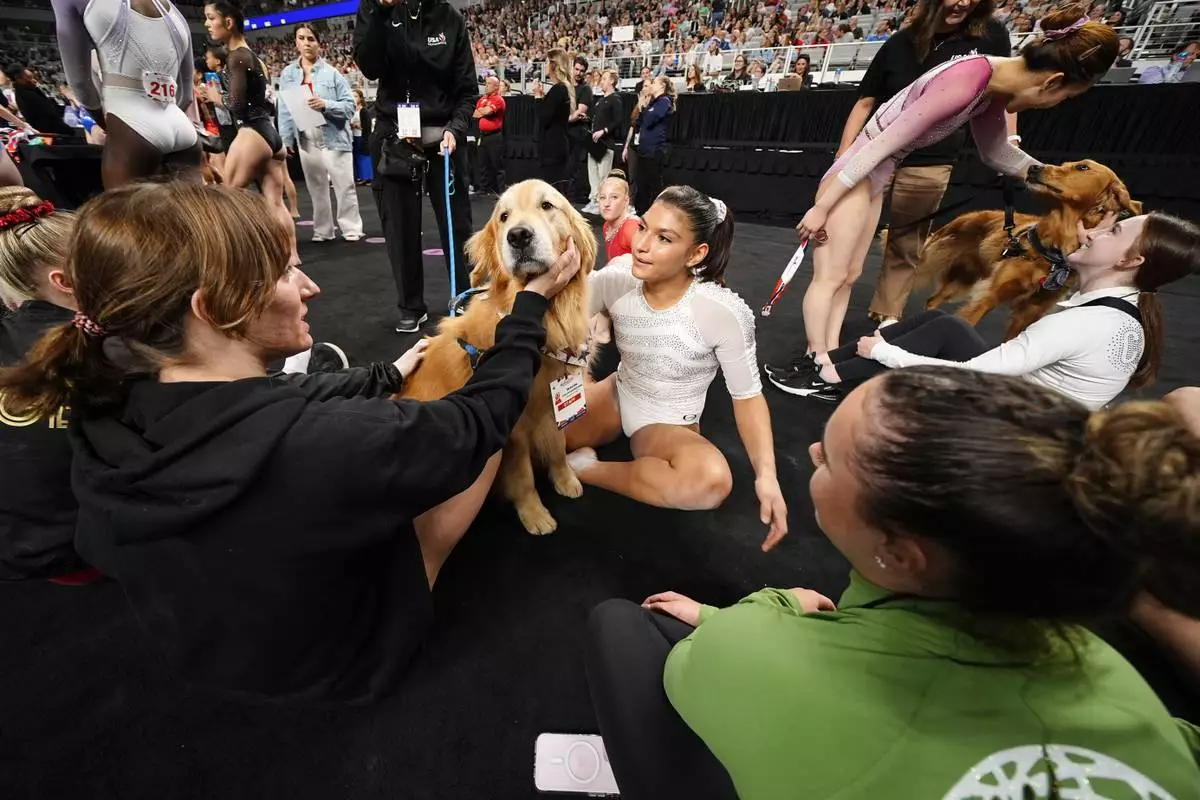
FILE - Support dogs are greeted by athletes during the U.S. Gymnastics Championships, June 2, 2024, in Fort Worth, Texas. USA Gymnastics makes therapy dogs a staple at major events to help gymnasts relax, they've also been a hit with coaches and judges, lowering anxiety levels all around. (AP Photo/Julio Cortez, File)
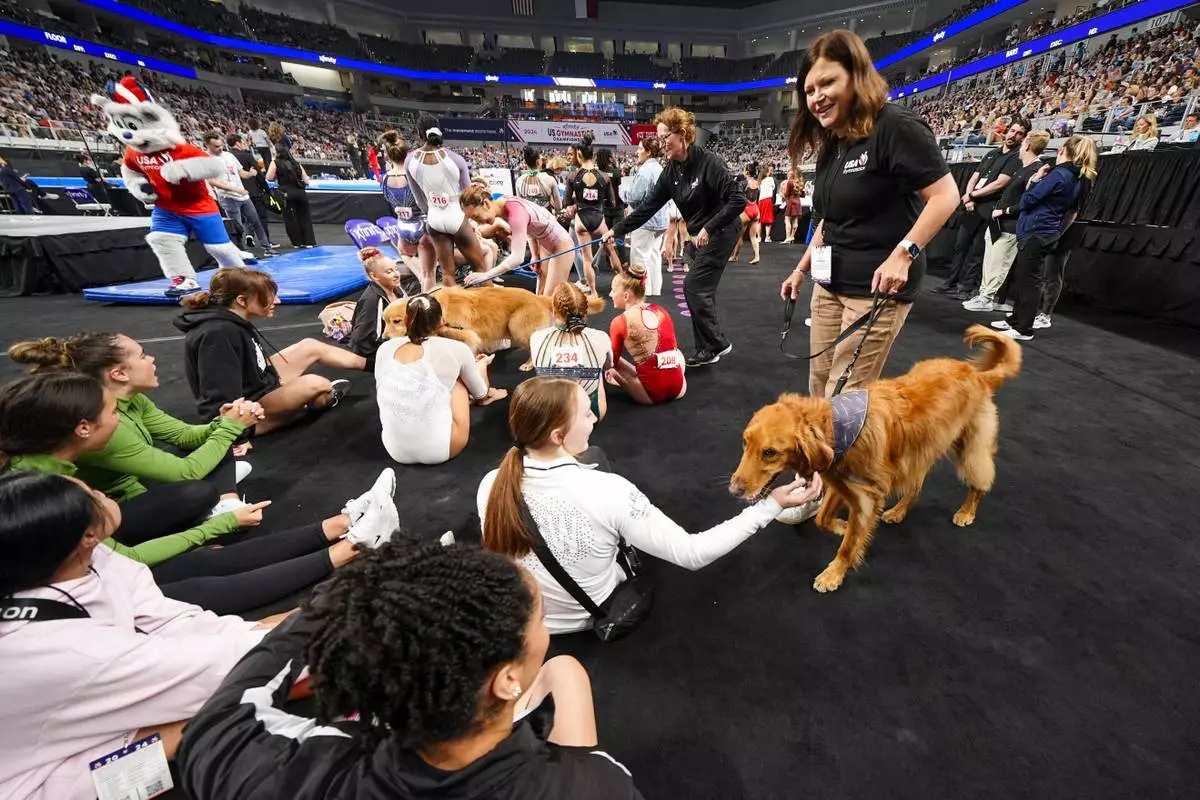
FILE - Support dogs are greeted by athletes during the U.S. Gymnastics Championships, June 2, 2024, in Fort Worth, Texas. USA Gymnastics makes therapy dogs a staple at major events to help gymnasts relax, they've also been a hit with coaches and judges, lowering anxiety levels all around. (AP Photo/Julio Cortez, File)



